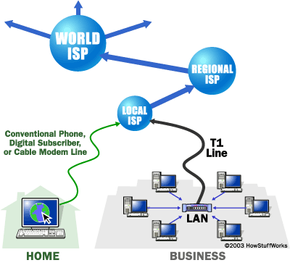The Internet
So what is "the Internet"? The Internet is a gigantic collection of millions of computers, all linked together on a computer network. The network allows all of the computers to communicate with one another. A home computer may be linked to the Internet using a phone-line modem, DSL or cable modem that talks to an Internet service provider (ISP). A computer in a business or university will usually have a network interface card (NIC) that directly connects it to a local area network (LAN) inside the business. The business can then connect its LAN to an ISP using a high-speed phone line like a T1 line. A T1 line can handle approximately 1.5 million bits per second, while a normal phone line using a modem can typically handle 30,000 to 50,000 bits per second.
ISPs then connect to larger ISPs, and the largest ISPs maintain fiber-optic "backbones" for an entire nation or region. Backbones around the world are connected through fiber-optic lines, undersea cables or satellite links (see An Atlas of Cyberspaces for some interesting backbone maps). In this way, every computer on the Internet is connected to every other computer on the Internet.
Advertisement
